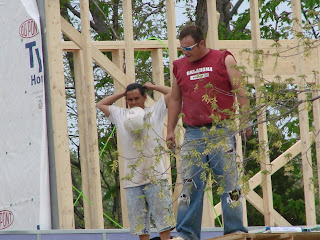From my pretty removed perspective, I know that there is homophobia in some Black communities. This dynamic has been getting a lot of attention lately due to reports, which I wrote about earlier, that Black voters in California were instrumental in the state’s electorate passing Proposition 8. While I believe that homophobia is a complicated problem, one that draws on competing narratives of sexuality, gender, and yes, race; and that all kinds of people suffer from and perpetuate homophobia, I didn’t really question the reports of the role of Black people and the success of proposition 8.
Luckily, some did, including this statistical analysis of voting demographics and proposition 8 which comes to the conclusion that “There Were So Many More White, Latino and Asian Votes in Favor of Proposition 8 That Blaming Black Folks is Both Bad Math and Racist Scapegoating of the Highest Order”. Ultimately, though, the point isn’t who is responsible for Prop 8’s success, it’s the fact that it passed in the first place. Reporting that simplifies incredibly nuanced issues and the scapegoating that follows masks the fact that there is so much that we all need to do, whether it’s addressing homophobia in the Black community, or in the culture at large, or racism within mainstream queer political groups or racism in the culture at large.
Today, as I was driving to work, I heard a crazy advertisement for a Burger King chicken sandwich on te radio. The story in the advertisement was a conversation between two construction workers. The younger worker whistled or said “hey baby” or something like that. He was reprimanded by the older worker because he wasn’t hollering at a woman. The younger worker replied that he was hollering at the chicken sandwich because it was so hot. The older construction worker corrected him, telling him in the future, that he should only make catcalls at women and not sandwiches because construction workers “have a reputation to uphold”.
So this is one of those jaw droppers where you can’t even begin to pick it apart and you’re just kind of in this “damn, that’s sexist” stupor.  What really bothers me about the commercial is that it makes street harassment something that construction workers do instead of something that happens throughout our culture.

If you look through websites like Holla Back NYC that document street harassment, you’ll find plenty of reports of being harassed by construction workers. I worry that, even in doing the important work of problematizing street harassment, we end up problematizing it only in the context of something construction workers do. This is certainly easier, because we can just add sexism to all the other race and class stereotypes that are easy to apply to certain types of workers. But, does it change anything? Even if, by some statistical analsysis, we were able to determine that construction workers harass people on the street more than other groups of people, it’s not just something that happens. Street harassment, as is the case with other assertions of or attacks on gender, is affected by forces that span our culture and history, and that affects us all.  Affirming, “construction workers harass women”, doesn’t do very much to change these cultural forces.
Growing up in a, at least supericially, politicaly conservative, monoculural place, sexism and homphobia weren’t abstract, but imagining the realities for women and queer people, if you weren’t either, was incredibly difficult. Still, I knew many men and straight people who lived differently from the sexism and homophobia that could have easily been considered the norm, whether they had the benefit of a culture that made them critical thinkers or not. The danger of the media analysis of Black people and Prop 8 or ads featuring sexist construction workers is that it makes it so much more difficult for people who defy the stereotypes. If you’ve never really thought about it, it’s just so much easier to go along with the expectation that people of your racial group are homophobic or that people who do your kind of work holler at women, then trying to think about these things criically from multiple directions. If you already have to confront so many stereotypes, it seems like it would suck to have to prove that you’re not homophobic or not sexist instead of just being an ally to queer folks and women.
Ultimately, I’m disappointed that we find it so easy to find a scapegoat instead of starting to do the work, and having the conversations, that need to happen now, as much as ever.